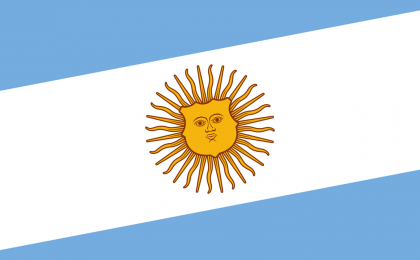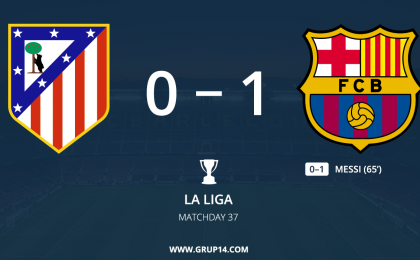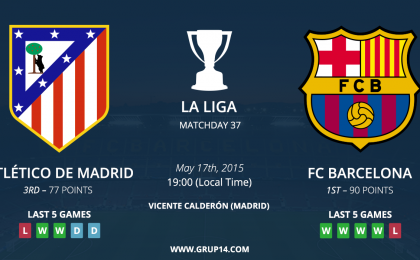 history | 2015-05-22
history | 2015-05-22
The Argentinians of FC Barcelona - Part One
From forgotten players to Maradona
FC Barcelona’s rich history shows a number of players making the jump from South America to Europe, most notably Brazilians and Argentines, playing for one of the greatest clubs in the world. While the current squad only has two Argentines wearing the Blaugrana shirt, there has been a total of 22 Argentines who have represented the club on the pitch along with two coaches on the sidelines. Despite being founded in 1899, we have to fast-forward all the way to 1947, or 48 years later, to see the first Argentine sign for the club.
An Argentine born to Catalan parents, Emilio Sagi Liñán became the first-ever Argentine to play for Barcelona. He had two stints at the club scoring over a hundred goals. His seasons in Barcelona lasted from 1916-1919 and 1921-1932 where he played a total of 434 matches and netted 138 goals. A strong left winger, he formed a great partnership with the legendary Paulino Alcántara. Also known for his penalty kick abilities, Emilio won one league title in 1928/29, as well as four Copas del Rey (1921/22, 1924/25, 1925/26 and 1927/28). On top of it all, he won an impressive 10 Catalonian titles with Barcelona.
Spending one season with the club, the forward Pedro Pascual Ros hit the back of the net four times in eight matches at Barcelona. Three of his four goals came in one match when he scored a hat-trick. He was in Barcelona in the 1939/40 season.
Midfielder Florencio Caffaratti won back-to-back La Liga championships -- Barcelona's third and fourth league titles in their history -- despite only playing for two seasons. Sandwiched between the league titles were a Copa Latina and a Copa Eva Duarte. In the 1947/48 season, he played only five matches but still scored six times. On his second season, he played nine matches and scored only once. At the end of the 1948/49 season, Caffaratti left the club and went back to play in Mexico before retiring in 1951.
Marcos Aurelio Di Paulo, another midfielder, was signed from Mexico, just like Caffaratti before him. Brought in from Club León, Di Paulo is probably most known for having scored Barcelona’s 1,000th goal in the league on October 22, 1950 against UE Lleida. He represented the club from 1948 to 1951.
Mateo Nicolau from Mexican club Atlante became the third Argentine to play at the Camp Nou. He was a forward who played for Barcelona from the 1948/49 season until the end of the 1951/52 season, featuring in a total of 63 matches and scoring 16 goals. During his time in Catalunya, he won two league titles; the first coming in his first season at the club and the second in his last season. He also won two Copa del Rey titles in his last two seasons, as well as a Copa Eva Duarte in his last season and two Copa Latinas, the first in 1948/49 and the second in 1951/52.
In 1949, Barcelona signed Humberto Giménez. The player stayed for one season taking part in seven league matches, scoring two goals and capping it by getting sent off.
Carlos Medrano was brought in the 1959/60 season, the first Argentine goalkeeper to play for Barcelona. He spent all of one season with the club, playing in a league campaign which was won by the Catalan club when they finished ahead of Real Madrid.
Juan Carlos Heredia, an Argentine by birth who represented Spain at the international level, was a striker who played for the club but not before going on loan. While he signed for Barcelona in 1972, he wasn't able to make his official team debut until 1974. The Spanish Football Federation made life difficult for the player and the club, not allowing him to play for Barcelona due to foreign-player restrictions. He went on to represent FC Porto and Elche on loan before actually debuting at the Camp Nou in the 1974 season. While he didn’t win a league title, he still lifted the Copa del Rey in 1978 and the UEFA Cup Winners’ Cup in the 1978/79 season, his final year at the club.
Rafael Zuviría, a versatile player, played for Barcelona from 1977 until 1982. Despite playing five seasons in Barcelona, amassing over 100 caps and hitting 11 goals, Zuviría never won a league title. He, however, did get four winners medals: Two Spanish Cups, the first in 1978 and the second in 1981, along with two Recopas de Europa (Cup Winners’ Cup) in 1979 and 1982. He played alongside legendary Barcelona players Bernd Schuster, Carles Rexach and the great Johan Cruyff. A move to Mallorca was next in the cards, joining them in the 1982 season before returning to Argentina to represent Defensores de Belgrano. He retired in 1986. Despite playing for such a big club, Rafael never played a single match for Argentina.
The 1982 World Cup was held in Spain and that tournament marked the World Cup debut of one Diego Maradona. Maradona, who would later go on to score memorable goals and win football’s greatest prize in 1986, played his first-ever World Cup match at the Camp Nou in 1982 against Belgium. Little did anyone know that the tournament in Spain would be a foreshadowing of his career at the club; that is to say, short and violent. El pibe de oro or the golden child as he’s known, transferred to Catalunya for a record world fee of $7.6 million. Barcelona’s coach in 1983 was another Argentine, the same man who coached Argentina to their 1978 World Cup victory, César Luis Menotti.
Maradona won three titles with the club: La Liga, Spanish Cup and Spanish Super Cup, all of which came in 1983. Trophies weren't the only things the legend got at Barcelona, he also won a battle with hepatitis followed by a broken ankle. He also figured in a brawl during an ill-tempered match against Athletic Bilbao. However, in the middle of all that was an ovation from the Bernabéu fans as Maradona scored a goal against the eternal rivals Real Madrid.
He racked up 22 league goals in 36 matches, a total of 38 goals in 58 matches, during his time at Barcelona. Diego being the character that he was and is, found himself having constant problems with then president José Luis Núñez which brought an end to his less-than romantic time at Barcelona in 1984, joining Italian club Napoli for another record fee of $10.4 million. One could even say the Camp Nou was robbed of seeing Diego’s real magic and his full potential, such was the case for another Argentine who would wear Barcelona’s number 10 shirt decades later.
During Diego’s brief spell at Barcelona, the club also signed another Argentinian: Jorge Gabrich was brought from Newell's Old Boys in 1983 and, despite spending four years at the club, only played two matches. Due to foreign limit restrictions, he spent most of his Barcelona career playing with the B-team.
Barcelona would have to wait over a decade before signing another player from the land of Diego. A Pichichi trophy winner for the 1995/96 season, Juan Antonio Pizzi was signed to Barcelona from Tenerife. A forward back in his day, he was never fully able to cement himself as the go-to forward of the team due to the presence of the great Ronaldo. A former teammate of current Barcelona manager Luis Enrique, Pizzi scored 11 times during his two seasons at the club, 1996/97 and 1997/98, winning six trophies: a UEFA Cup Winners’ Cup, a UEFA Super Cup, a league title, two Spanish Cups and a Spanish Super Cup.
Mauricio Pellegrino passed by Barcelona for one season in 1998 and while in Catalunya he took part in 23 league games in a league-winning season for the club. He left the club after one season, staying in Spain to join Valencia where he became a club legend as a renowned center back.
The next few years would lead to several Argentine players joining Barcelona, most of them coming from one of the biggest clubs in the country, River Plate. In 2001, the club signed two players from the aforementioned club. Javier Saviola and Roberto Bonano were the River Plate duo who made the jump across the Atlantic. Bonano was the second, and last one thus far, Argentine goalkeeper to play for Barcelona. He was a backup goalkeeper at the 2002 World Cup for his national team and became the first-choice goalkeeper in Barcelona. In his first season, despite competition from José Manuel “Pepe” Reina and Frenchman Richard Dutruel, he was the starting goalkeeper for the club.
A 2-1 victory against Sevilla on August 26, 2001 marked Bonano’s Blaugrana debut. His second season in Barcelona (2002/03) saw the exit of both Reina and Dutruel and the signing of German goalkeeper Robert Enke along with the promotion of a certain Victor Valdés to the first team. Bonano remained the goalkeeper of choice for the first half of that season as Valdés began getting more matches and ultimately establishing himself as the club’s preferred goalkeeper. Bonano was then sold at the end of the 2002/03 season to Real Murcia.
The signing of Javier Saviola happened in the 2001/02 season. El conejo (the rabbit) was 19 when he joined the club back in 2001 for a hefty fee of €35.9 million. Having already made a name for himself in his native Argentina with his boyhood club River Plate, Saviola was coming off a stellar 2001 U20 World Cup where not only did Argentina win the tournament, he also finished as top goalscorer with 11 goals in seven matches and elected the tournament’s best player. However, Saviola’s time at Barcelona was less than impressive. Though it must be said, the team was going through constant coaching changes, four coaches in just over two seasons to be exact, which didn’t seem to help his situation. Goalscoring wise, his first season with Barcelona was his best one, finishing with 17 league goals, placing fourth in the Pichichi race, behind fellow teammate Patrick Kluivert, Real Madrid’s Fernando Morientes and league top scorer Diego Tristán of Deportivo who finished with 21 goals. In his second and third seasons, Saviola finished with 13 and 14 league goals respectively. He ended up being loaned to AS Monaco as the Catalans went to sign Samuel Eto’o on that same summer.
After spending one season out on loan at Monaco, Saviola returned to Spain where he played for Sevilla for a year. Ironically enough, that was where he won his first trophy in Spain, the UEFA Cup. Finishing joint second top scorer of the UEFA Cup with six goals, Saviola went back to Barcelona for one last season in 2006/07, but with Barcelona’s front-line trident of Samuel Eto’o, Ronaldinho and Lionel Messi, Saviola's role was mainly of a substitute, starting only six of the 18 league matches he took part in that season. Saviola’s time at Barcelona came to an end in the summer of 2007 when he signed with Real Madrid.









